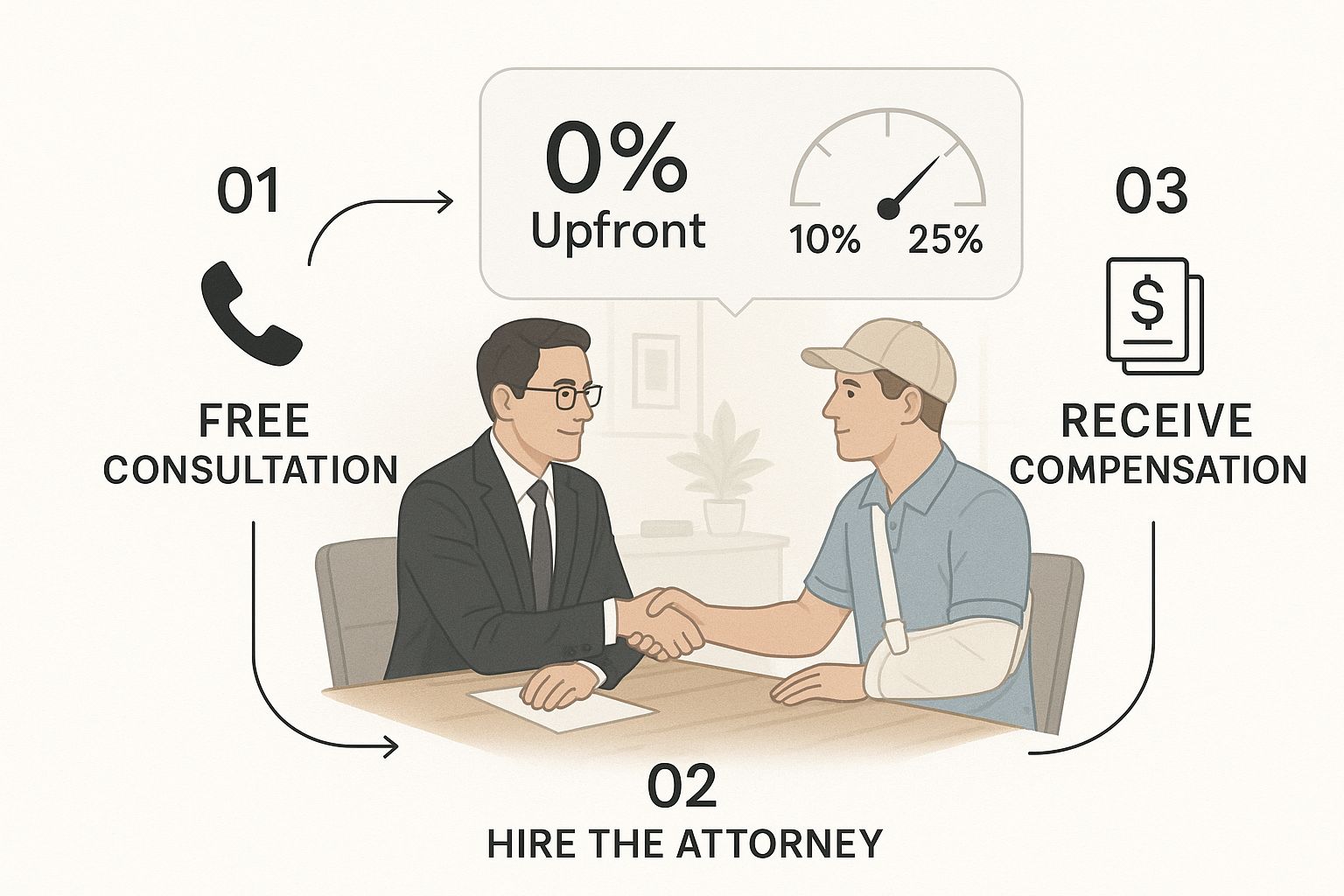Understanding Workers Comp Lawyer Cost
"I was satisfied once John Bell took over my case."
"Communication was always timely."
Understanding Workers Comp Lawyer Cost
If you're hurt on the job, the idea of adding a lawyer's bill to your worries is probably the last thing you want. But here’s the good news: the cost to hire a workers' comp lawyer is almost always zero dollars upfront. Most attorneys in this field use what’s called a "no win, no fee" model. In simple terms, you only pay if they win your case and get you benefits.
That payment isn't a separate bill you have to figure out how to pay—it comes directly out of your final settlement or award.
So, What Does a Workers Comp Lawyer Actually Cost?
When you’re trying to recover from a work injury, you don’t need another financial burden. Thankfully, the workers' compensation system is built with that in mind. Instead of billing you by the hour like in many other legal fields, attorneys work on what’s known as a contingency fee basis.
Think of it like a partnership. Your lawyer puts their own time, effort, and resources into building your case because you both have the same goal: to win. If they succeed in getting you a settlement, their fee is just a pre-agreed percentage of that amount. If they don't win your case, you owe them absolutely nothing for all the work they did.
The Contingency Fee Model Explained
This “no win, no fee” setup is a game-changer. It means anyone can get expert legal help, no matter their financial situation. It levels the playing field, giving you a professional advocate to stand up to the big insurance companies without you having to risk a single dime out of your own pocket. The entire fee is contingent on them getting you a successful result.
This infographic breaks it down visually, showing how there are no upfront costs—just a straightforward percentage that comes out of the benefits you receive.

The key takeaway here is that your lawyer's success is tied directly to your own. They only get paid when you do.
Typical Fee Percentages in Oregon
To keep things fair and protect injured workers, state laws keep a close eye on these attorney fees. Most states, including Oregon, put a cap on how much a lawyer can charge on a contingency basis. Generally, you can expect the fee to be somewhere between 10% to 25% of the compensation you're awarded. You can get a broader sense of how these caps work in this helpful overview of lawyer fee structures.
To make it even clearer, let's break down the common costs you might see.
A Quick Look at Lawyer Costs
This table sums up the main fee structures and costs involved when you hire a workers' compensation attorney, so you know exactly what to expect.
| Attorney Fee | 10% - 25% Contingency Fee | You pay nothing upfront. The lawyer's fee is simply a portion of the final settlement, and only if you win. |
| Case Costs | Advanced by the Firm | Your lawyer often covers upfront expenses like getting medical records or hiring expert witnesses. These are then paid back out of the settlement amount. |
Ultimately, this structure is designed to give you peace of mind. You get the legal muscle you need without the financial risk, allowing you to focus on what truly matters: your recovery.
How Contingency Fees Protect Injured Workers
The term ‘contingency fee’ might sound like more legal jargon, but it’s actually a system built to protect you, the injured worker. It’s a very simple, powerful promise: you don’t pay any attorney fees unless your lawyer wins your case. It’s why you often hear it called a "no win, no fee" agreement.
This model is a game-changer. Think about it: insurance companies have deep pockets and a team of lawyers on speed dial, ready to push back on your claim. The contingency fee structure gives you a fighting chance by providing access to expert legal help without any upfront cost. It puts you on equal footing.
The "No Win, No Fee" Promise in Action
So, what does this look like in the real world? It's refreshingly straightforward.
When you bring on an attorney, you both agree on a set percentage of whatever settlement or award they win for you. That percentage is their fee. They then get to work, fronting all the costs of their time and effort to build and fight your case.
If they win, their fee is taken out of the money they recover for you. If they don't win—meaning you get no benefits—you owe them absolutely nothing for all the hours they poured into your case. Their success is tied directly to yours.
This shared-risk approach means your attorney is 100% invested in getting you the best possible outcome. They only get paid if they win you the benefits you deserve.
Let's break it down with a quick example:
- Your Settlement: You are awarded a workers' compensation settlement of $30,000.
- Your Fee Agreement: You agreed to a 25% contingency fee.
- The Math: $30,000 multiplied by 0.25 equals $7,500.
- The Result: Your attorney receives $7,500 from the settlement, and you get the remaining $22,500 (minus any separate case costs).
No hidden fees, no surprise bills. It’s all calculated right from the settlement itself.
State Rules and Fee Caps
This isn't the Wild West. States like Oregon have put firm rules in place to protect injured workers from unfair charges. There are legal caps on the maximum percentage a workers' compensation lawyer can charge.
These regulations ensure the system stays true to its purpose: helping you recover, not adding another financial weight to your shoulders. It makes getting expert legal help a safe, smart decision. While this article is focused on workers' comp, you can read more about how disability lawyers get paid under a very similar contingency model. These legal protections are there to make sure hiring an expert is an accessible tool for justice.
Why Are Oregon Attorney Fees Going Up?
It's one thing to talk about average attorney fees in general, but the situation on the ground here in Oregon tells a much more specific story. The cost of legal help isn't a fixed number; it's constantly shifting in response to economic pressures, changes in the law, and especially, the tactics insurance companies use to handle claims.
Lately, the trend in Oregon is unmistakable: fighting for your workers' comp benefits has become a tougher and more expensive battle.
This isn't just a feeling people have. The data backs it up, painting a clear picture of a system where having a professional on your side is becoming less of a choice and more of a necessity. The total amount of attorney fees paid out in disputed cases is climbing, which tells us one simple thing: more and more injured workers are running into roadblocks they can't get past on their own.

The Numbers Don't Lie
When you dig into the official state data, the trend is impossible to ignore. Over the last several years, the total dollar amount of attorney fees awarded at workers' compensation hearings has been on a steady upward march.
Figures from the Oregon Workers' Compensation Division show that total attorney fees awarded at hearings shot up from $20.77 million in 2017 to $30.2 million in 2023. That’s a staggering 45% increase in just six years. This isn't just a minor blip; it's a massive shift that signals how contentious securing benefits has become. For a deeper dive, you can see the complete breakdown in the state's official Attorney Fee Report.
This sharp rise isn't happening by accident. It’s a direct reflection of the growing number of disputes that have become so complicated they require a judge to step in and make a decision.
What This Trend Means for Injured Workers
This isn’t just an abstract statistic; it’s a bright red flag for anyone who gets hurt on the job in Oregon. When you see awarded attorney fees rising this quickly, it means insurance carriers are denying, delaying, or lowballing benefits more often, forcing injured workers to lawyer up just to get a fair shake.
So, what's driving this? A few key factors are at play:
- More Aggressive Claim Denials: Insurers are increasingly challenging claims from the get-go, trying to minimize their payouts.
- Complex Medical Disputes: Cases involving serious injuries, long-term disabilities, or conflicting medical opinions almost always require a skilled legal argument to win.
- A Complicated System: The workers' comp process is a maze of strict deadlines and procedural rules that can easily trip up someone trying to navigate it alone.
When the total amount of fees paid to lawyers goes up, it means more cases are being fought—and won—by attorneys. It shows that professional guidance is no longer a luxury but a fundamental part of getting a fair outcome.
Ultimately, the rising cost of legal representation in Oregon is a symptom of a much tougher claims environment. It reveals a widening gap between what insurance companies are willing to offer and what injured workers are actually owed under the law, making an experienced attorney more critical than ever.
When you start looking for a workers' comp attorney, the conversation usually centers on their fee. But that’s only part of the story. To really get a handle on the finances of your claim, you need to understand the crucial difference between attorney fees and case costs.
Think of it like building a house. The attorney's fee is like the payment to your general contractor for their skill, time, and managing the project. The case costs, on the other hand, are like the price of the lumber, concrete, and wiring—the raw materials needed to construct a strong case.
These two expenses are handled completely separately. While your lawyer's fee is a percentage taken from your final award, case costs are direct, out-of-pocket expenses paid to third parties to gather the evidence needed to win.
Attorney Fees vs. Case Costs: What’s the Difference?
You might be wondering, "Do I have to pay for all these costs upfront?" The answer is almost always no. Any credible workers' comp law firm will advance these costs for you. They’ll cover the expenses needed to move your case forward and then get reimbursed from the settlement money at the very end.
This arrangement is a huge relief. It means your ability to build a powerful claim isn't limited by what you can afford to pay out of pocket right now. Your focus can stay on your recovery.
So, what are we talking about when we say "case costs"? These are the specific, necessary expenses for things like:
- Medical Records: Hospitals and clinics charge a fee to copy and send your official medical files.
- Court Filing Fees: There are administrative charges for filing your claim and other documents with the Oregon Workers’ Compensation Board.
- Expert Witness Fees: Sometimes, your case needs a boost from an outside medical expert who can write a report or testify about your injury. Their time is valuable and comes at a cost.
- Deposition Costs: This is the fee for a court reporter to create an official transcript of sworn testimony from you, your doctors, or other important witnesses.
To make this distinction crystal clear, here’s a simple breakdown of the two main types of expenses you'll see in a workers' compensation case.
Attorney Fees vs Case Costs Breakdown
| Attorney Fees | The lawyer's time, legal expertise, strategy, and representation. | A percentage of your final settlement or award (contingency basis). |
| Case Costs | Out-of-pocket expenses paid to third parties for evidence. | Advanced by the law firm and reimbursed from the settlement funds. |
Seeing it laid out like this helps clarify that your lawyer is essentially fronting the money required to build your case, which is a standard and ethical practice in this field of law.
The key takeaway is that your lawyer fronts these necessary expenses. This allows them to build the strongest possible case for you without you ever needing to reach into your own pocket during the process.
Seeing the Full Financial Picture
These costs are more than just line items; they are investments in the strength of your claim. For example, a huge part of any case is proving the full extent of your medical needs. This can involve documenting the physical costs of treating severe workplace injuries like disc herniation, which can require extensive and expensive long-term care. Your attorney pays to get this evidence on the record to fight for the settlement you truly deserve.
Once your case is resolved, the settlement funds are distributed in a specific order. First, the law firm is reimbursed for all the case costs they advanced. Then, the attorney's contingency fee is calculated from what's left.
Understanding this from the start gives you a transparent, no-surprises view of how the finances will shake out. If you're curious about what those final numbers can look like, reviewing typical workers' comp settlement amounts can give you a better frame of reference. This clear financial structure lets you put money worries aside and concentrate on what matters most: getting better.
How Your Job Affects Legal Complexity
The cost of a workers' comp lawyer isn't just about a simple percentage; it’s also a direct reflection of how complicated your case is likely to be. A straightforward, undisputed claim for a minor injury is one thing. But a severe, career-ending injury in a high-risk job? That's a completely different battle, and your profession is a huge factor in predicting which path your claim will take.
Think of it this way: a slip-and-fall in an office and a multi-story fall at a construction site might both cause injuries, but the legal aftermath will be worlds apart. The severe injuries common in high-risk fields—like construction, manufacturing, or agriculture—naturally lead to higher medical bills, longer recovery times, and more arguments over permanent disability benefits.
These high-stakes situations are exactly where insurance companies dig in their heels, questioning every detail to minimize what they have to pay out. This is precisely why the industry you work in is such a strong indicator of whether you’ll need a lawyer in your corner.
High-Risk Industries and Higher Legal Stakes
Some jobs are just more dangerous. It’s a simple fact, and the data on legal disputes backs it up. Claims from safer environments, like an office, often get resolved with less friction. However, when injuries are severe and the financial stakes climb, litigation becomes far more common.
Statistics show a dramatic difference in litigation rates depending on the industry. For example, the rate can be as low as 2.2% in education, but it can skyrocket to over 12% in construction. This gap is also mirrored in legal spending. In agriculture, legal fees can eat up 17% of total claim costs—more than double the rate for public entities. You can explore more data on how litigation rates differ across sectors and learn about new approaches to managing workers' compensation claims.
The more dangerous the job, the higher the odds of a complex injury, and the greater the likelihood you’ll face a legal fight to get the benefits you are owed.
When Legal Complexity Requires an Expert
The connection here is pretty clear: riskier jobs often lead to more complicated claims, which in turn demand more intensive legal work. An attorney’s role in these cases goes far beyond just filing paperwork.
- Gathering Specialized Evidence: Proving the full impact of a complex injury often means hiring medical specialists or vocational experts to provide critical testimony.
- Navigating Fierce Opposition: High-value claims attract intense scrutiny from the insurance company's legal team, requiring an equally skilled attorney to fight back.
- Managing Court Proceedings: If a claim ends up in court, knowing how to effectively communicate with a judge is crucial—a task your lawyer handles to navigate the system's complexities on your behalf.
Ultimately, your profession helps set the stage for a potential dispute. Understanding this helps you see that a workers' comp lawyer's fee is really an investment in overcoming the specific challenges your industry throws your way.
Is Hiring a Lawyer a Smart Investment?
After looking at how lawyers get paid, the big question is always the same: is it actually worth it? It’s completely understandable to hesitate when you think about a slice of your settlement going to attorney fees. But I always tell clients to reframe that thinking. Don't see it as a cost—see it as an investment in your future.
Think about it this way. You wouldn't try to navigate a complex medical procedure without a surgeon, right? The legal system is its own kind of complex beast. A good workers' comp attorney acts as your guide and champion, using their deep knowledge of the system to get you the best possible outcome—one that's almost always better than what you could get on your own.

The Tangible Return on Your Investment
The value an attorney brings isn't just a vague promise; it shows up in real dollars and cents. Time and again, the data shows that injured workers with legal help end up in a much better financial position.
Remember, insurance companies are for-profit businesses. Their primary goal is to protect their bottom line, which often means paying you as little as they can get away with.
Studies show that injured workers with a lawyer on their side typically receive about 30% more in compensation than those who handle their claims alone. This isn't just a coincidence. The contingency fee model incentivizes your attorney to fight for every penny you deserve. You can find more details on how legal fees often lead to better outcomes on LegalMatch.
An attorney's fee is often a small price to pay for a much larger settlement. Their involvement frequently pays for itself and then some.
It’s About More Than Just a Bigger Check
While a higher settlement is obviously a huge plus, the real value of a good lawyer goes far beyond just the money. Their support can be the difference between a stressful, drawn-out battle and a focused, successful recovery.
When you hire an attorney, you’re getting:
- A Professional Shield: They become the point of contact for the insurance adjuster. No more stressful phone calls or pressure tactics—they handle all of it.
- Expert Navigation: The workers' comp system is a maze of paperwork and strict deadlines. One missed form or date can sink your entire claim. Your lawyer keeps everything on track.
- A Strategically Built Case: They know exactly what it takes to build a strong claim. This means gathering the right medical records, working with vocational experts if needed, and presenting a compelling case for your full and fair compensation.
Trying to manage all that while you're also trying to heal from an injury is a recipe for disaster. Knowing when to hire a workers' comp lawyer is the first step in offloading that burden and putting your focus back where it belongs: on your recovery.
A Few Lingering Questions About Attorney Costs
Even after breaking down the numbers, it's natural to have a few more questions rattling around. The financial side of a legal claim can feel complex, so let's tackle some of the most common concerns injured workers have about what it really costs to hire a lawyer.
What if We Lose the Case? Do I Still Owe Anything?
Absolutely not. This is probably the biggest relief for most people. Workers' comp attorneys in Oregon work on what’s called a contingency fee basis.
Think of it as a "no win, no fee" guarantee. Your lawyer only earns a fee if they successfully win benefits for you. If, for whatever reason, your claim isn't successful, you won't owe a dime in attorney fees for the hours they put in. This system lets you get top-tier legal help without any upfront financial risk.
The beauty of the contingency fee is that it puts you and your lawyer on the same team. Their success is tied directly to your success.
Is the Fee Percentage Set in Stone?
Oregon law puts a firm ceiling on how much an attorney can charge, but there can sometimes be a little wiggle room below that cap. The final percentage might depend on how straightforward or complex your case is expected to be.
The one thing that's non-negotiable is that a lawyer can never charge more than the state-mandated maximum. The best thing to do is have an open conversation about fees during your first meeting. That way, there are no surprises, and everyone knows what to expect right from the start.
Does the Fee Come Out of My Medical Bills?
This is a critical point: no, it does not. Your attorney's fee is calculated only from the monetary compensation you receive for your disability and lost wages.
The money designated for your medical care—payments to doctors, hospitals, physical therapists, and so on—is completely separate and is never touched. Your fee agreement will spell this out clearly, so you can rest assured that your treatment will never be impacted.
If you've been injured on the job in Oregon, you don't have to face the insurance company alone. At Bell Law, our experienced attorneys are ready to fight for the full benefits you deserve. Contact us today for a free, no-obligation consultation to discuss your case.
Disclaimer: The information on this page is provided for general informational purposes only and is not legal advice. Reading this content does not create an attorney-client relationship. For advice about your specific situation, please contact a licensed attorney.







